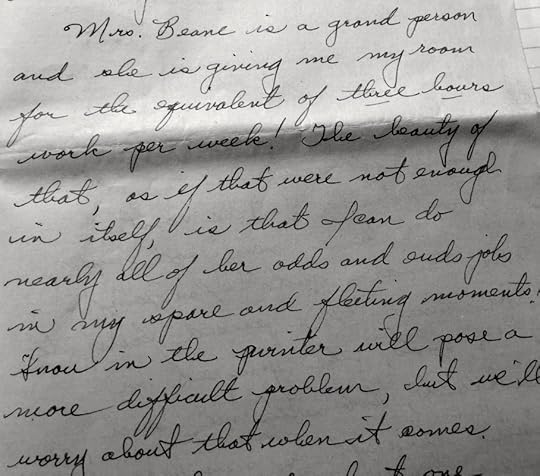carpe noctem interview: kelly dumar
 Two of Cups Press, 2017 THINGS WE’RE DYING TO KNOW…
Two of Cups Press, 2017 THINGS WE’RE DYING TO KNOW…Let’s start with the book’s title and your cover image. How did you choose each? And, if I asked you to describe or sum up your book, what three words immediately come to mind?
“Tree of the Apple” is the name of my prose poem about planting a tree with my father as a teenager at a time of grief. The cover photo is of my parents on a vacation I refer to in “Sunday Afternoon in Memory Care He Remembers She’s Gone,” about my father looking at this photo after my mother’s death – and after he has Alzheimer’s, and remembers she’s gone.
Only three words? Alzheimer’s Father, Daughter. Can I have six? Story is an anchor – he drifts.
What were you trying to achieve with your chapbook?
I wanted to feel close to my father every day I was losing him to Alzheimer’s. Also, because he was smart and funny and brave and tender and hopeful and appreciative – and he fought back hard against losing what he loved, and I admired him for that even when it made caretaking scary and tough.
I wrote poetry as a way to understand what he was trying to tell us after he lost his words – his caretakers, friends, loved one. Also, his “wrong” words activated my poetic imagination with fresh, startling metaphors and point of view.
I wrote because what he was telling – his stories – fascinated me and being with him as an adult daughter I was often flooded with childhood memories. My siblings, my mother, I felt like I was writing to stay connected and whole as a family. I wrote poems to express love and also, perhaps, some rage at the devastation of the loss. I wrote to be clear about what our relationship gave me, how it shaped me. I admired very much how my father coped with dementia – how intensely he kept loving us, loving life, loving everyone he met. I wanted to inspire others to find a creative response to this kind of ambivalent loss – I wrote to keep my father vital in my life.
Tell us about the world you were trying to create, and who lives in it.
Myra Shapiro, a poet who kindly wrote a blurb for the cover, summed it up well: “We are in a world of lilacs and lovers, marrying earth to human nature, spanning life from courtship, to marriage, to Alzheimer’s and death.”
What do you love to find in a poem you read, or love to craft into a poem you’re writing?
Finding, as a reader or writer - what I call the secret reveal – the “aha” – epiphany, insight, transformative awakening – why am I bothering to write this and revise and revise? Why is not a conscious awareness at the start – why doesn’t surface until many revisions, or even the final one. I write a poem to say what I didn’t know I knew or felt, and craft it mysteriously and beautifully - so that finding the secret reveal requires energy – and creates The secret reveal is the payoff, the take-away, for reader, writer, self.
Can you share an excerpt from your book? And tell us why you chose this poem for us to read – did it galvanize the writing of the rest of the collection? Is it your book’s heart? Is it the first or last poem you wrote for the book?
"Mrs. Beane’s Snow" is the heart of the book, because this poem embodies what I believe about our need for storytelling: the most meaningful stories we tell are ones the people we care about need and long to hear, over and over again. These are stories we learn by listening, deeply to what the people closest to us care about and believe, so we can tell them back to them in times of need.
Mrs. Beane gave my father a home away home that he could just barely afford while he attended Harvard on the GI Bill. From the stories he always told us, it was clear the home she provided him with – in exchange for a few chores like keeping the coal furnace burning and shoveling her driveway when it snowed - made a profound impact. After Alzheimer’s, retelling the favorite stories he’d told us for years of his time with Mrs. Beane was a sure-fire way to comfort and distract him during difficult emergency room or doctor or dentist visits. Dad, remember the winter you broke your collar bone playing hockey, yes! when you lived with Mrs. Beane, and after they sent you home from the emergency room you shoveled her whole driveway with one arm in a cast?
Finding this original letter he wrote to his parents on Sept. 24, 1948 was a eureka moment – his first letter to his parents on his arrival to Harvard. This letter introduces this iconic figure in his life. And, such irony – his foreshadowing of the snow!

Mrs. Beane’s Snow
A story is an anchor. He drifts.
A story is a map. His direction
is lost. Mrs. Beane is a story. A name
is a compass. A street is a library. Her home
is a borrowed book. Story runs in circles.
Her driveway is a place to park. A river runs
past him. Brattle runs from Harvard Yard to Mrs. Beane.
Any ordeal is a landmark. A crisis has an ending
and before that a test. Once upon a time A pond
freezes in winter. Within walking distance
grows a boy with skates. This story has a sister.
A hero may be rescued more than once.
A story is a goal held by a net. Hockey is game
you win on ice. A threshold is college after a war.
A dormitory houses students with treasure.
A Brahmin can be a widow who lets rooms.
Young men of a certain character may call it home.
A battlefield is an ice rink. A collarbone broken
is a setback. A nurse can be a sister who is called.
Comfort is a cast but it’s not an elixir.
In snowy storms a driveway is a hurdle.
A stunning blow is one useful arm and a shovel.
A calling can be a lady in distress.
A shovel of snow must be lifted.
A shovel of snow must be heaved.
A shovel of snow must be lifted.
A shovel of snow must be moved.
One arm can lift one foot can heave.
There are so many shovels of strong.
A driveway is a place you can leave and return.
A river runs from mine to hers.
Home is a place to find what you give.
A listener longs for story.
An elixir is how it tells you.
Telling loves Mrs. Beane’s snow.
I’ve heard poets say that they’re writing the same story over and over in their poems. Is that true for you?
A poetry mentor recently told me I write about something rare in poetry: deep family love. I think that’s true. I write a lot about my parents, my childhood, my aging parents, my siblings, the way we’ve fought and made up, the ways we’ve protected, trusted, betrayed and leaned on each other; and also failed each other, and how our affection endures, how we’ve forgiven each other. I write a lot about breaks in relationships and how they are healed; also, about reinvention, the possibility of beginning again after loss.
Do you think poets have a responsibility as artists to respond to what’s happening in the world, and put that message out there? Does your work address social issues?
More than ever we’re called on to respond creatively – to resist, with our minds, emotions and actions authoritarian principles that threaten our democratic ideals. Yes, I find myself, writing more and more politically – even when I start out writing a nature poem, it seems to veer very quickly into political themes, consciously and unconsciously. I think this is happening right now to most of the poets I know – we cannot pay attention to what’s going on in the news without wanting to respond in writing as honestly, deeply, and creatively as we can to challenge small minds, authoritarian impulses, and careless thinking and action that bears grave consequences to people who deserve respect and protection.
Are there other types of writing (dictionaries, romance novels, comics, science textbooks, etc.) that help you to write poetry?
Definitely dictionaries! And also Nature Guides. I write a lot from my daily photos of plants and other living and non-living matter I find in the woods – plus weather, clouds, sky, the Charles River, various swamps, and the seaside when I’m there. I look a lot of things up in various nature guides to get a name and identity of what I’m writing about. Sometimes I start writing about the photo with just one word that comes to mind spontaneously. Then I look it up, really chew on the meaning, go to the thesaurus, and pretty quickly a theme emerges, I have a way in to a first draft.
What are you working on now?
A full-length chapbook of poetry and short prose; also, a photo-inspired nature poetry blog I work on daily that I plan to develop into a book
What books are you reading that we should also be reading?
Difficult Women, Roxane Gay
Hillbilly Elegy, J. D. Vance
Pond, Claire-Louise Bennett
A Manual For Cleaning Women, Lucia Berlin
Without stopping to think, write a list of five poets whose work you would tattoo on your body, or at least write in permanent marker on your clothing, to take with you at all times.
Carolyn Forche
Sharon Olds
William Wordsworth
Seamus Heaney
Elizabeth Bishop
***
Purchase Tree of the Apple. [image error]
Kelly DuMar is a poet, playwright and workshop facilitator from the Boston area. Her poems are published in many literary magazines, including Tupelo Quarterly, r.k.v.r.y, Unbroken, Lumina Online, Kindred, The Good Men Project, Literary Orphans, and more. Her award-winning poetry chapbook, All These Cures, was published by Lit House Press, 2014. Her award-winning plays have been produced around the US and Canada, and are published by dramatic publishers. DuMar founded and produces the Our Voices Festival of Women Playwrights at Wellesley College, now in its 11th year. She serves on the board & faculty of The International Women’s Writing Guild. Visit her online at www.kellydumar.com or www.kellydumar.com/blog.
Published on February 09, 2017 04:41
No comments have been added yet.



